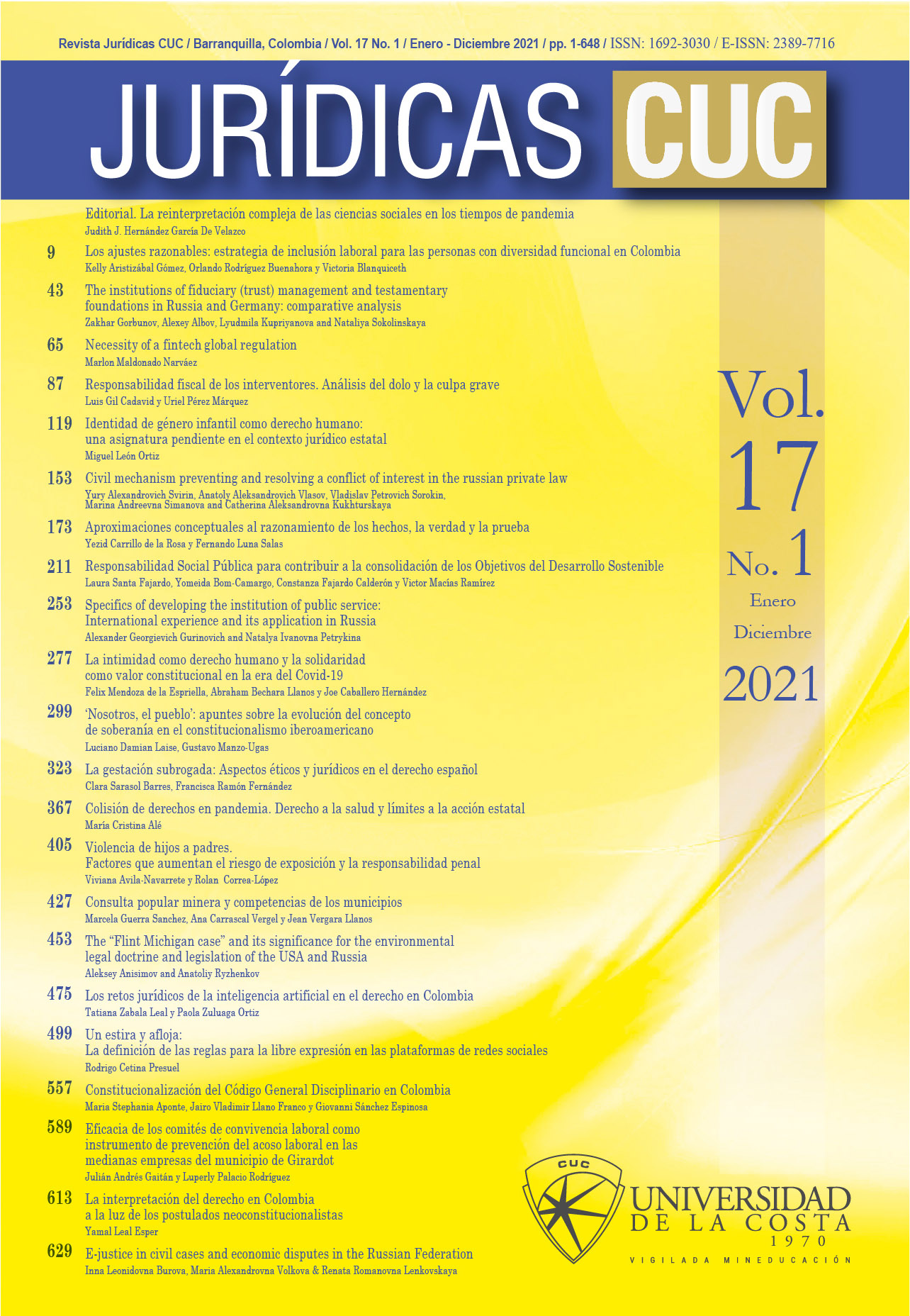The interpretation of the law in Colombia in the light of the neoconstitutional postulates
DOI:
https://doi.org/10.17981/juridcuc.17.1.2021.21Keywords:
binding nature, regulatory force, udicial guarantee, judicial guarantee and interpretation, neoconstitutionalism, direct applicationAbstract
The constitutional state, for several years has called for a new theory of law, which is separated from the traditional scheme of theoretical positivism, based on subsuntion as a method of interpretation to solve the different legal problems affecting society; This theory is called “Neoconstitutionalism”, a concept that explains a recent phenomenon within the contemporary Constitutional State that presents a new interpretative attitude of law based on the ideas of supremacy of the constitutional text, its binding strength and judicial guarantee. In this order of ideas, the general objective of this article of reflection is to analyze whether in Colombia the right to the light of neoconstitutional postulates is interpreted and influenced in the practice of law. To achieve this objective, a qualitative methodology with a documentary approach was used, carrying out a bibliographic review where various contemporary traffickers have studied the neoconstitutional influence on the Colombian legal system, based on the role that judges play in exercising the exercise of interpreting the right at the time of resolving so-called difficult cases. Finally, the answer to the general objective is given in three major subtitles: the first is a theoretical approach to the term neoconstitutionalism as a legal theory; the second is the presentation of its most important postulates, and the third makes it possible to appreciate whether in Colombia the interpretation of the law is carried out in the light of neoconstitutional principles, and then to make a discussion on the subject, and the conclusions of the investigation.
Downloads
References
Carbonell, M. (2018). ¿Qué es el neoconstitucionalismo? [video de youtube]. Retrieved from https://www.youtube.com/watch?v=l6XmEfzaFGI
Carbonell, M. (2013). Derechos fundamentales y democracia. México, D.F.: Instituto Federal Electoral.
Carbonell, M. (ed.) (2006). Teoría del neoconstitucionalismo. Ensayos escogidos. Madrid: Trotta.
Carbonell, M. y García, L. (2010). El canon neoconstitucional. Bogotá, D.C.: Universidad Externado. Disponible en https://ideas.repec.org/b/ext/derech/332.html
Comanducci, P. (2002). Formas de (neo)constitucionalismo: un análisis meta-teórico. Isonomía, (16), 89–112. Disponible en http://www.cervantesvirtual.com/obra/formas-de-neoconstitucionalismo--un-anlisis-metaterico-0/
García, L. (2010). Constitución como provisión e irradiación Constitucional. Sobre el concepto de “neoconstitucionalismo” Segunda parte. Estudios de Derecho, 148(66), 91–119. Disponible en https://revistas.udea.edu.co/index.php/red/article/view/5208
García, J. (2009). Sobre el Neoconstitucionalismo y sus precursores. F. Mantilla (coord.), Controversias constitucionales (pp. 24–69). Bogotá D.C.: UR. Disponible en http://repository.urosario.edu.co/handle/10336/11088
García, L. (2008). El “nuevo derecho” en Colombia: ¿entelequia innecesaria o novedad pertinente? Revista de derecho, (29), 289–330. Disponible en https://rcientificas.uninorte.edu.co/index.php/derecho/article/view/2698
García, L. (2005). La renovación de las virtudes del juez en el nuevo derecho sin lagunas: Retos de la labor judicial a partir de la Constitución de 1991. Jurídicas, 2(2), 41–61. Disponible en http://juridicas.ucaldas.edu.co/
Gil, R. (2011). El Neoconstitucionalismo y los derechos fundamentales. Quíd lurís, 12(6), 43–61. Recuperado de https://revistas-colaboracion.juridicas.unam.mx/index.php/quid-iuris/article/view/17373/15582
Guastini, R. (2007). Estudios de teoría constitucional. (3 ed.). México, D.F.: Fontamara.
León, J. (2015). Consideraciones sobre los procesos de enseñanza-aprendizaje en matería jurídica. En, Ó. Agudelo, M. Prieto & J. León, Teoría jurídica y enseñanza del derecho (pp. 11–29). Bogotá, D.C.: Universidad Católica de Colombia. Disponible en https://repository.ucatolica.edu.co/handle/10983/18964
Marín, J. y Zuluaga, D. (2013). Estado constitucional: marco institucional esencial para la comprensión de los límites de la reforma constitucional. Criterio Jurídico, 13(1), 141–169. Disponible en https://revistas.javerianacali.edu.co/index.php/criteriojuridico/article/view/968
Mattos, A. (2001). Implicaciones de la constitucionalización del derecho penal en la dogmatica penal colombiana. Aplicable al tipo penal de falsedad en documento público. Jurídica Mario Alario D’Filippo. Cartagena (Colombia), X(19), 48–66. Recuperado de https://repositorio.unicartagena.edu.co/bitstream/handle/11227/7653/2143-4617-1-SM.pdf;jsessionid=15FD290F03DD63C183495B4EFAB18EFB?sequence=1
Prieto, L. (2003). Justicia Constitucional y Derechos Fundamentales. Madrid: Trotta.
Prieto, L. (2001). Neoconstitucionalismo y Ponderación Judicial. Anuario de la Facultad de Derecho de la Universidad Autónoma de Madrid, (5), 201–227. Recuperado de http://afduam.es/wp-content/uploads/pdf/5/6900111(201-228).pdf
República de Colombia. Asamblea Constituyente. (1991). Constitución Política de la República de Colombia. [Const.]. Gaceta Constitucional Nº 116. Disponible en http://bit.ly/2NA2BRg
República de Colombia. Corte Constitucional. (19 de abril de 2010). Exps. T-2442387 y T-2482388 acums. [Sentencia T-267]. MP: Juan Carlos Henao Pérez. Disponible en https://www.corteconstitucional.gov.co/relatoria/2010/T-267-10.htm
República de Colombia. Corte Constitucional. (6 de noviembre de 2008). Exp. T-1966364. [Sentencia T-1094]. MP: Clara Inés Vargas Hernández. Disponible en https://www.corteconstitucional.gov.co/relatoria/2008/t-1094-08.htm
Saavedra, M. (1994). Interpretación del derecho y crítica jurídica. México, D.F.: Fontamara.
Torres, H. (2017). El principio de igualdad en la configuración de los regímenes pensionales. Bogotá, D.C.: Universidad Externado. Disponible en https://bdigital.uexternado.edu.co/handle/001/657
Vásquez, G. y Barrios, A. (2018). Supremacía constitucional: enfoque teórico del conflicto de jerarquía, jurisdicción y competencia. Universidad y Sociedad, 10(1), 156–163. Disponible en https://rus.ucf.edu.cu/index.php/rus/article/view/775
Downloads
Published
How to Cite
Issue
Section
License
Copyright (c) 2021 JURIDICAS CUC

This work is licensed under a Creative Commons Attribution-NonCommercial-NoDerivatives 4.0 International License.
The authors are exclusively responsible for the published articles, which do not necessarily reflect the views of the editorial committee.
JURIDICAS CUC respects the moral rights of authors who have assigned the property rights on the published materials to the editorial committee. In turn, the authors declare that the work they submit has not been previously published.


 English
English
 Español (España)
Español (España)



